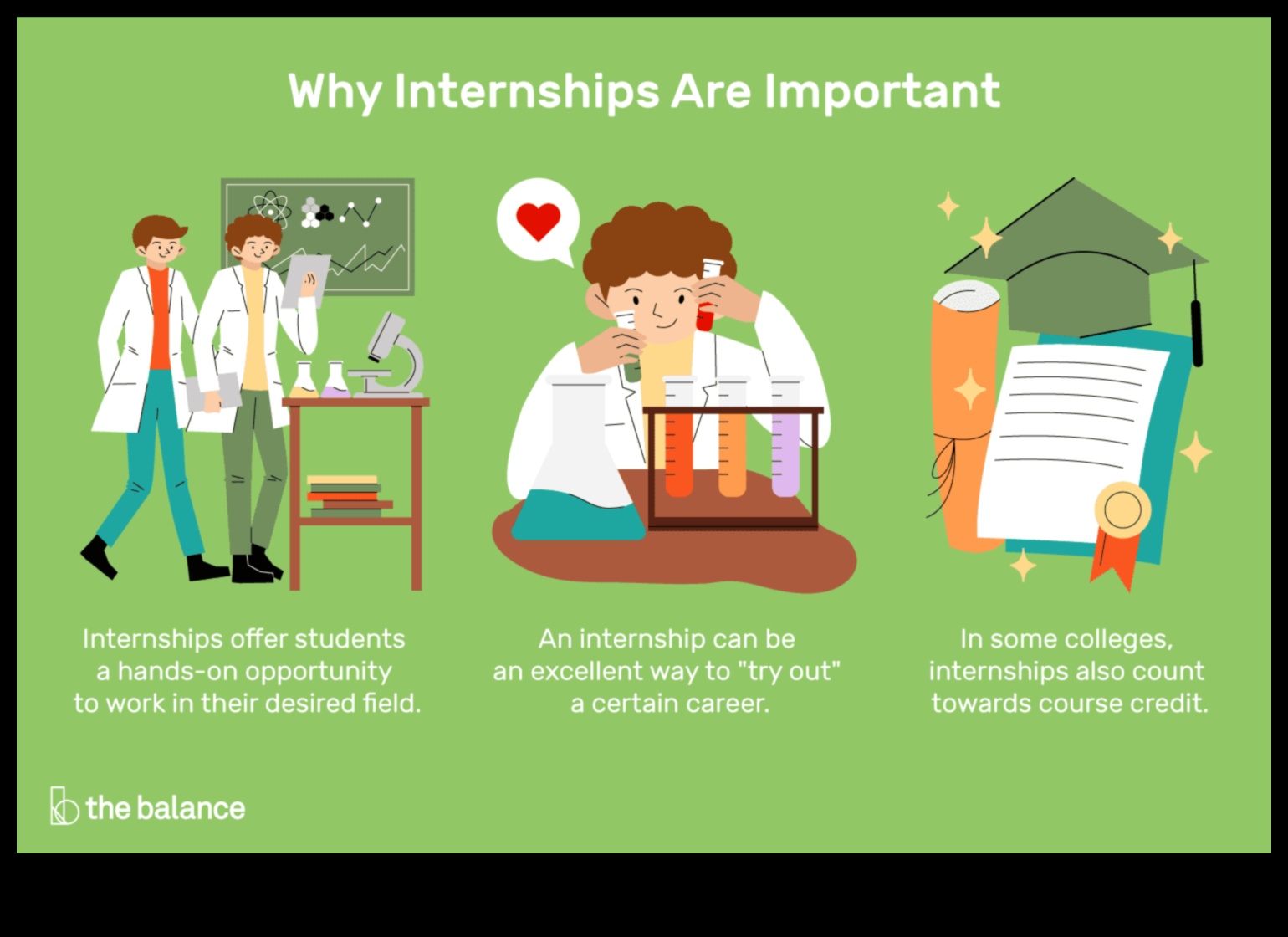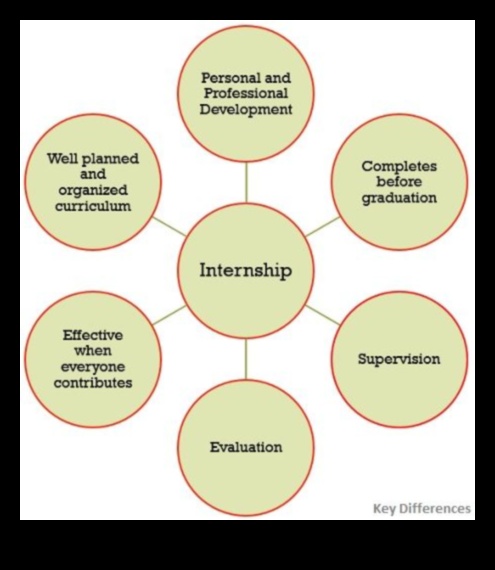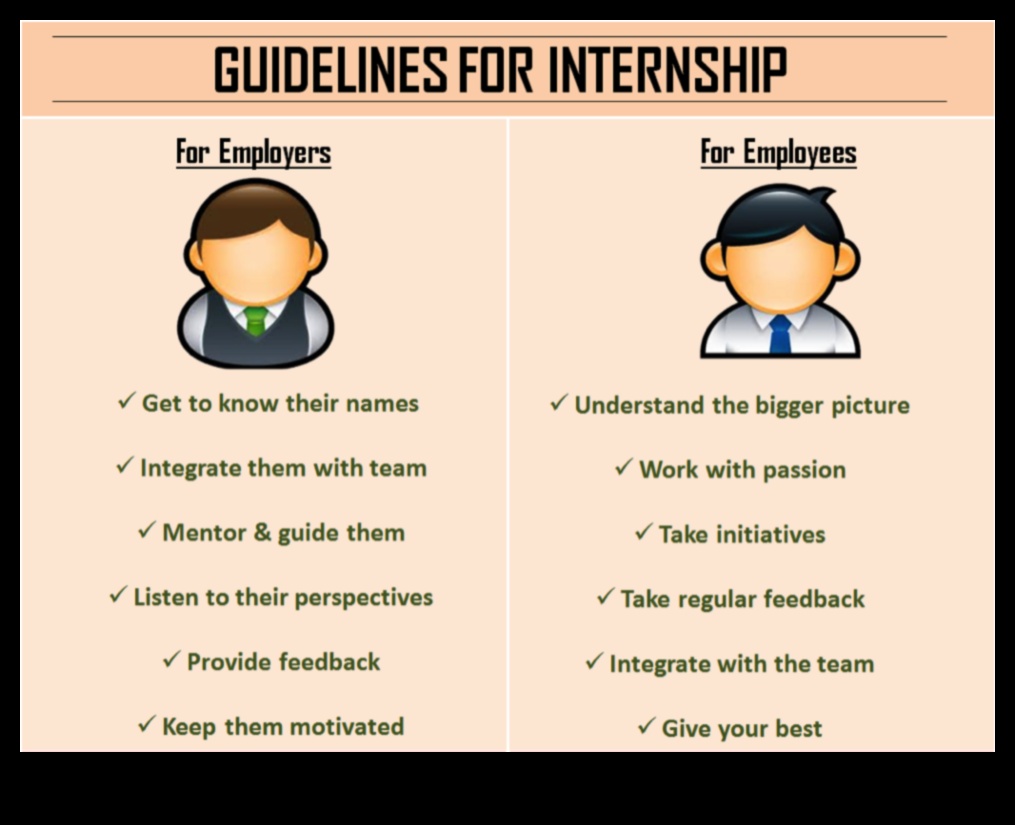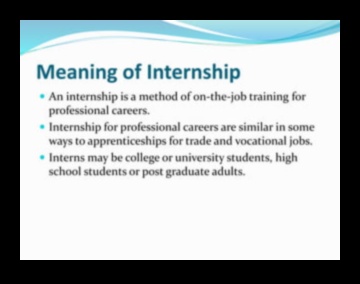
What is an internship?
An internship is a temporary position in which a student or recent graduate works for a company or organization in order to gain experience in a particular field. Internships can be paid or unpaid, and they typically last for a few months.

Types of internships
There are many different types of internships available, depending on the industry you’re interested in. Some common types of internships include:
- Business internships
- Marketing internships
- Engineering internships
- Computer science internships
- Medical internships
Benefits of internships
Internships offer a number of benefits for students and recent graduates, including:
- Gaining valuable experience in your field of interest
- Networking with professionals in your industry
- Building your resume and boosting your job prospects
- Learning new skills and knowledge
- Getting a taste of the corporate world

How to find an internship
There are a few different ways to find an internship. Here are a few tips:
- Search online job boards and internship websites
- Contact companies directly to inquire about internship opportunities
- Talk to your professors, classmates, and friends and family for referrals
- Attend career fairs and networking events

How to apply for an internship
When applying for an internship, it’s important to put your best foot forward. Here are a few tips:
- Tailor your resume and cover letter to the specific internship you’re applying for
- Do your research on the company and the internship position
- Practice your interview skills
- Be prepared to answer questions about your skills, experience, and goals

What to expect during an internship
Internships can vary in terms of what you can expect to do. However, there are some general things you can expect during an internship, including:
- Working on real-world projects
- Getting feedback from your supervisors
- Networking with other interns and employees
- Learning new skills and knowledge
- Having fun
How to make the most of your internship
Internships are a great opportunity to learn and grow. Here are a few tips for making the most of your internship experience:
- Be proactive and take initiative
- Ask questions and seek out feedback
- Get involved in extracurricular activities
- Network with your colleagues and supervisors
- Stay positive and enthusiastic
What to do after an internship
After your internship is over, there are a few things you can do to follow up and make the most of your experience. Here are a few tips:
- Write a thank-you note to your supervisor and colleagues
- Update your resume and LinkedIn profile with your internship experience
- Continue networking with your colleagues and supervisors
- Seek out other internship opportunities
FAQ
Here are some frequently asked questions about internships:
- Q: What is the difference between an internship and a job?
- A: Internships are typically temporary positions that are designed to provide students and recent graduates with experience in a particular field. Jobs, on the other hand, are permanent positions that offer employees benefits such as health insurance and paid time off.
- Q: How long do internships typically last?
- A: Internships can vary in length, but they
Topic Answer What is an internship? An internship is a temporary job that provides students or recent graduates with practical experience in a particular field. Types of internships There are many different types of internships, depending on the field you are interested in. Some common types of internships include: Benefits of internships Internships can provide you with a number of benefits, including: Internship experience Internships can give you valuable experience in your field of interest. II. Types of internships
There are many different types of internships available, each with its own unique benefits. Some of the most common types of internships include:
- Academic internships
- Government internships
- Corporate internships
- Non-profit internships
- Research internships
When choosing an internship, it is important to consider your interests, skills, and career goals. It is also important to research the different types of internships available to make sure you find one that is a good fit for you.
What is an internship?
What is an internship?
An internship is a temporary position in which a student or recent graduate works for a company or organization in order to gain experience and learn about a particular field. Internships can be paid or unpaid, and they typically last for a few months.
Internships are a great way for students to get their foot in the door of a particular industry and learn about what it’s like to work in a professional setting. They can also help students develop their skills and make connections that can lead to future jobs.
There are many different types of internships available, so students can find one that fits their interests and career goals. Some popular internship fields include business, marketing, technology, and healthcare.
If you’re interested in finding an internship, there are a few things you can do. First, start by doing some research to find companies or organizations that offer internships in your field of interest. You can also reach out to your professors or classmates for leads. Once you’ve found a few potential internships, you can apply for them online or by sending your resume and cover letter to the hiring manager.
Internships can be a great way to learn and grow, and they can also help you get your foot in the door of a particular industry. If you’re interested in finding an internship, be sure to do your research and apply for as many positions as you can.
V. How to apply for an internship
There are a few different ways to apply for an internship. You can:
- Search online job boards and internship websites
- Network with your friends, family, and professors
- Contact companies directly
- Attend internship fairs
When you apply for an internship, be sure to:
- Tailor your resume and cover letter to the specific internship
- Highlight your skills and experience that are relevant to the internship
- Be prepared to answer questions about your interest in the internship and your qualifications
For more information on how to apply for an internship, check out our guide on how to apply for an internship.
VI. What to expect during an internship
During an internship, you can expect to learn new skills, gain experience in your field, and network with professionals. You will also be expected to work independently and as part of a team.
Here are some specific things you can expect during an internship:
- You will be assigned tasks that are relevant to your field of study.
- You will work with a mentor or supervisor who can provide you with guidance and support.
- You will have the opportunity to network with professionals in your field.
- You will learn new skills and gain experience that will help you in your career.
It is important to remember that internships are not just about getting a job. They are also about learning and growing as a professional. By taking advantage of the opportunities that an internship provides, you can set yourself up for success in your career.
VII. How to make the most of your internship
An internship can be a valuable experience that can help you learn new skills, network with professionals, and get a foot in the door of your desired career. However, in order to get the most out of your internship, you need to make sure you’re taking advantage of all the opportunities it has to offer. Here are a few tips for making the most of your internship:
- Be proactive. Don’t just wait for your supervisor to give you work to do. Take the initiative and ask for more tasks. This will show that you’re eager to learn and that you’re willing to go above and beyond.
- Get involved. In addition to your assigned tasks, get involved in other activities at your internship. This could include attending company events, joining a company club or committee, or volunteering for special projects. Getting involved will help you meet more people and learn more about the company.
- Network. One of the best things about an internship is the opportunity to network with professionals in your field. Make an effort to talk to your supervisor, your colleagues, and anyone else you meet during your internship. These connections can be invaluable when you’re looking for a job after graduation.
- Ask for feedback. At the end of your internship, ask your supervisor for feedback on your performance. This feedback can help you identify areas where you need to improve, and it can also be used to strengthen your resume and cover letter when you’re applying for jobs.
- Stay positive. An internship can be challenging, but it’s important to stay positive and focused. Remember that you’re learning new skills and gaining valuable experience that will help you in your career.
By following these tips, you can make the most of your internship and get the most out of your experience.
What to do after an internship
After your internship is over, there are a few things you can do to make the most of your experience and help you prepare for your next job.
- Write a thank-you note to your supervisor and any other mentors you had during your internship. This is a great way to show your appreciation for their time and support, and it can also help you stay in touch with them after your internship is over.
- Update your resume and LinkedIn profile with your new internship experience. This will help you stand out to potential employers when you’re applying for new jobs.
- Reflect on your internship experience and what you learned. What were your biggest accomplishments? What challenges did you face? What did you enjoy the most about your internship? Taking some time to reflect on your experience can help you identify your strengths and weaknesses, and it can also help you identify areas where you want to grow in your career.
- Network with your colleagues and mentors. Your internship is a great opportunity to build relationships with people in your field. These relationships can be helpful for finding a job, getting advice, and staying up-to-date on industry trends.
- Continue learning and growing. Your internship is just one step in your career journey. There are always new things to learn and new skills to develop. Keep challenging yourself and growing your knowledge and skills, so that you can be a valuable asset to any employer.
IX. FAQ
Here are some frequently asked questions about internships:
-
What is the difference between an internship and a job?
-
How much does an intern make?
-
What are the benefits of doing an internship?
-
How do I find an internship?
-
How do I apply for an internship?
-
What to expect during an internship?
-
How to make the most of your internship?
-
What to do after an internship?
What is an internship?
Types of internships
Benefits of internships
How to find an internship
How to apply for an internship
What to expect during an internship
How to make the most of your internship
What to do after an internship
FAQ Q: What is an internship?
A: An internship is a temporary position in which a student or recent graduate works for a company or organization in order to gain experience in a particular field.Q: What are the different types of internships?
A: There are many different types of internships, depending on the field you are interested in. Some common types of internships include:
* Marketing internships
* Sales internships
* Finance internships
* Technology internships
* Human resources internships
* Public relations internshipsQ: What are the benefits of internships?
A: Internships offer a number of benefits for students and recent graduates, including:
* Gaining valuable experience in your field of interest
* Networking with professionals in your field
* Getting a foot in the door at your dream company
* Improving your resume and job prospects
* Learning new skills and developing your professional skills